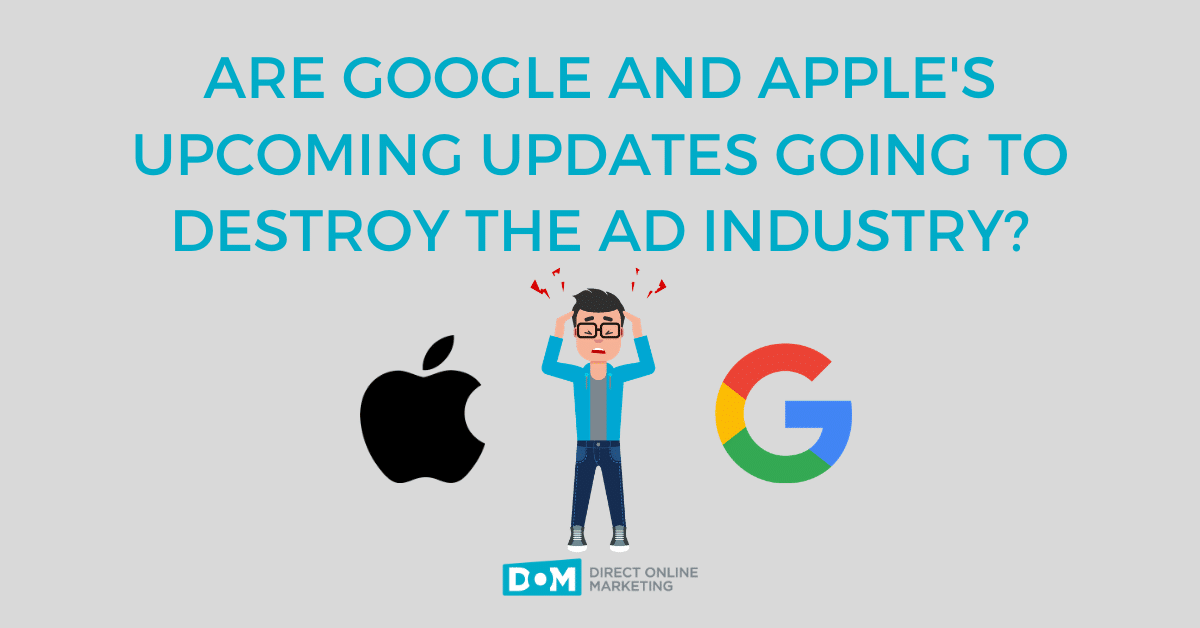
Big changes in company policies can mean big changes for the businesses that rely on them for their continued operation. Google is constantly shifting the landscape of its business, and we lucky digital marketers get to run behind their cake train.
The changes are so fast and reliably unpredictable that we’ve all grown accustomed to modifying our practices to match what the algorithm demands (or seems to demand, since it’s still pretty obfuscated). But now we have additional players to deal with, like the biggest company in the world (as of 2020): Apple.
We all saw how quickly Adobe Flash fell by the wayside when Apple officially refused to support it on iPhones. (Adobe itself is set to kill Flash permanently in December 2020.) As Tim Cook, CEO of Apple, said to Congress last week, Apple doesn’t technically have the largest market share of mobile devices, but its influence is widespread. Apple’s footprint might be smaller than other manufacturers, but those are some pretty heavy feet.
A fun game to play is to watch Apple make big moves, have those moves openly questioned by the tech press, and then watch other companies quietly copy them until Apple’s original “mistake” looks prescient. After all, Apple gets the credit for its wide support of USB, getting rid of the floppy drive, then the CD drive, and moving to solid-state hard drives. Apple isn’t even always the first to make big moves (like replacing all USB-B ports on its laptops with USB-C), but it’s those changes that make the market move.
Companies copy Google because they have to. They copy Apple because they want to. The difference to a CMO, or anybody in digital marketing, is irrelevant in the end because we all end up dancing to the same tune, no matter who started singing it.
So what’s the rumpus?
There are actually two looming changes coming to the way digital marketers interface with their customers and their data, and we have Europe to thank for it. Thanks, Europe!
Actually, it’s the EU, and it’s hard to argue with the intent, even if the execution of that intent means a whole lot more work for everybody else. Yes, this is tangentially about the GDPR, but it’s also about data privacy, and we should all care about that. Data privacy and data security are not only extremely important to us as marketers but as consumers, too.
Here’s What Google is Doing
The big news from Google is that, by 2022, they will disable all third-party cookies in the Chrome browser. They’re not exactly a maverick in this decision, since Apple (and its large mobile market share) already beat them to it by disabling third-party cookies in Safari by default (though the user can still elect to opt-in).
Is This Going to Destroy the Ad Industry?
Considering Google derives upwards of 80% of its revenue from ads, they have no reason to want to see the industry suffer. If that knowledge alone is not enough to deter you from your apocalyptic nightmares, consider what, exactly, this means.
The two kinds of cookies we deal with are first-party and third-party cookies. When you visit a website and you log in to its secure servers, you want it to remember you the next time you visit. That website deposits a cookie in your browser, so it knows when you’re you. Those first-party cookies are good. We like them and we want those to continue to operate as they always have, because they do good things for everyone involved, from consumers to companies.
The third-party cookie is the one we worry about. It’s been planted by a website other than the one you’re using, and it might be tracking what you do on behalf of a website you don’t even use, or a company you would rather not know what your Amazon habits are. That doesn’t mean all third-party cookies are bad. Nor that they are representative of a troubling trend. It just means you, the consumer, don’t know what’s being done with that information. Don’t worry, though, it’s probably just being used to retarget you for a product you’ve already researched somewhere else.
If There’s Nothing to Worry About Here, Why Are People Talking About it?
That’s a great question! The simple answer is: Google is taking the slow approach (2022 is still two whole years away), and instead of getting rid of the functionality of third-party cookies altogether, it wants to keep what we like about the information those cookies give marketers while preserving the user’s privacy. Everybody wins with Google’s Privacy Sandbox, which is going to be Google’s answer to all of those laws being passed. Look for more on that as it rolls out in the coming years. Part of Google’s response has been to calmly reassure us that if a standard replacement for third-party cookies isn’t ready by their deadline, then they won’t go ahead with it.
Okay, Now What’s This About Apple?
Due to some misread screenshots shown at Apple’s latest announcement of its biggest changes in years to every single one of its operating systems, lots of people immediately jumped to the conclusion that, with the next version of Safari (14, due out in the fall of 2020), Apple was going to be blocking Google Analytics. If you don’t know why that might make people nervous, it’s because everybody and their mother uses Google Analytics.
Apple Would Never Block Google Analytics
But that doesn’t mean Apple’s next versions of its various operating systems across all of its devices aren’t going to be an issue, for two reasons:
- We don’t know how, exactly, Safari will behave when it’s released.
- It’s not released yet.
Those are kind of the same thing, but you get the picture: it’s not out yet, and we only have the Public Beta to go on. Considering how much the Public Beta typically changes from one version to the next, until finally settling as a GM release (or Golden Master), we can make a pretty good guess.
What got this all started was a screenshot of Safari’s new set of notifications for third-party tracking. You can click one button and get a full report of every cookie trying to track you and where that tracking is coming from. You also will be able to disable any cookie you don’t like with a very simple interface.
Is This Going to Destroy the Ad Industry?
Definitely not. Apple’s new protocols are a reaction to the GDPR and its ilk, but they’re also heading in the same direction as everybody else in the tech industry: more privacy, more control, more transparency.
This Is All Good News for Everybody
What both of these changes signal is a net gain for everybody involved. Businesses aren’t interested in displaying ads to people who don’t want to see them, and customers don’t want to see ads for things they’re not interested in buying. Both Apple and Google, and their many competitors, are helping us digital marketers get better leads, and to connect consumers to products and services they want. This is all a movement toward giving power over your data back to you and me, the consumers.
If you would like to learn more about how an agency can help you figure all of this stuff out, get in touch with us today. Or, to get more information on this topic, contact us today for a free consultation or learn more about our status as a Google Partner Agency before you reach out.



